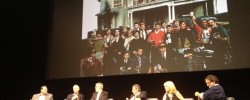
Review: The Sapphires (2012)
Cast: Chris O’Dowd, Deborah Mailman, Jessica Mauboy
Director: Wayne Blair
Country: Australia
Genre: Biography | Comedy | Drama | Musical
Official Trailer: Here
It’s a story of multicultural appeal if ever there was one: an Australian group with Irish management entertain American troops in the Vietnam War. Rooted in the true story of a pair of Aboriginal sisters and their two cousins who embrace soul music on the urging of a talent scout-cum-manager, The Sapphires makes entertaining fiction of intriguing fact, overlaying racially-charged dramedy with toe-tapping musicality.
Well-served is the clash of egos and intents; less so is the wider context of the story. Thompson and Briggs’ deployment of big issues, namely racial tension and the backdrop of the Vietnam War, never attain any particular thematic weight, seeming to function more as narrative window-dressing than meaningful source of conflict.
 Adapted by Keith Thompson and Tony Briggs from the latter’s 2004 play, The Sapphires’ stage-based origins serve to accentuate the focus on the difficulties surrounding the planning of the tour. The writers’ scope is trained far more on the group dynamic as they enmesh, both with each other and with this new management. Well-served is the clash of egos and intents; less so is the wider context of the story. Thompson and Briggs’ deployment of big issues, namely racial tension and the backdrop of the Vietnam War, never attain any particular thematic weight, seeming to function more as narrative window-dressing than meaningful source of conflict. It’s an apt word for the film’s biggest problems, conflict: the script is terribly contrived in its construction of dramatic tension, introducing one romantic subplot too many and concocting several questionable sources for strife between the characters.
Adapted by Keith Thompson and Tony Briggs from the latter’s 2004 play, The Sapphires’ stage-based origins serve to accentuate the focus on the difficulties surrounding the planning of the tour. The writers’ scope is trained far more on the group dynamic as they enmesh, both with each other and with this new management. Well-served is the clash of egos and intents; less so is the wider context of the story. Thompson and Briggs’ deployment of big issues, namely racial tension and the backdrop of the Vietnam War, never attain any particular thematic weight, seeming to function more as narrative window-dressing than meaningful source of conflict. It’s an apt word for the film’s biggest problems, conflict: the script is terribly contrived in its construction of dramatic tension, introducing one romantic subplot too many and concocting several questionable sources for strife between the characters.
Wayne Blair makes a confident debut as feature director, though the marks of his inexperience are easy to identify, most prominently in the clunkiness of the concluding act. Here is where the film most directly deviates from its stage play origins, expanding to explore in greater detail its Vietnamese context. Requiring the introduction of some degree of action, this move exposes certain weaknesses in Blair as helmsman; he has difficulty making the change from intimate five-hander to the wider war setting, and struggles to hold the story together on this grander scale. Where he does succeed significantly, though, is in his evocation of the era: the film portrays a keen sense of the period, the use of background music the like of Deep Purple’s “Hush” contributing an authentic military verisimilitude.
Chris O’Dowd, once more impressing with his uncanny aptness as comic anchorage, lands the majority of the movie’s biggest laughs. His Dave is a compelling—if occasionally overbearing—presence, well-equipped to right the film’s trepid balance between comedy and drama.
 It’s the performances that keep the film afloat as its more egregious drawbacks begin to see it tread water. They are the omnipresent spark of life, vivacious fonts of energy that maintain a sense of narrative drive when all else around them fails. Chris O’Dowd, once more impressing with his uncanny aptness as comic anchorage, lands the majority of the movie’s biggest laughs. His Dave is a compelling—if occasionally overbearing—presence, well-equipped to right the film’s trepid balance between comedy and drama. He functions equally well in eliciting the best from Deborah Mailman, whose Gail is the only member of the eponymous group characterised to a satisfying degree. She solely shoulders the weight of the film’s drama for much of the running time, making her an ideal foil to O’Dowd’s antics; the pair between them are the heart of the film, their relationship often its sole saving grace.
It’s the performances that keep the film afloat as its more egregious drawbacks begin to see it tread water. They are the omnipresent spark of life, vivacious fonts of energy that maintain a sense of narrative drive when all else around them fails. Chris O’Dowd, once more impressing with his uncanny aptness as comic anchorage, lands the majority of the movie’s biggest laughs. His Dave is a compelling—if occasionally overbearing—presence, well-equipped to right the film’s trepid balance between comedy and drama. He functions equally well in eliciting the best from Deborah Mailman, whose Gail is the only member of the eponymous group characterised to a satisfying degree. She solely shoulders the weight of the film’s drama for much of the running time, making her an ideal foil to O’Dowd’s antics; the pair between them are the heart of the film, their relationship often its sole saving grace.
Yet even that one brief aspect that touches upon greatness is cruelly withheld in the problems of Thompson and Briggs’ script, which directs the relationship between Dave and Gail toward territories steeped in inadvisability. It is, sadly, the expected end for a film so beset by the rigidity of formulaic adherence, merely the unsurprising icing on a cake baked with liberal measures of contrivance and familiarity. And yet for all the disappointment of so many stones left unturned, so many themes left untackled, so many interesting roads not taken, The Sapphires is a perfectly pleasant watch, an infectiously cheery and charmingly amusing offering. There’s fun to be had here, as long as its ease can be forgiven.
Related Posts
![]()
Ronan Doyle
![]()
Latest posts by Ronan Doyle (see all)
































